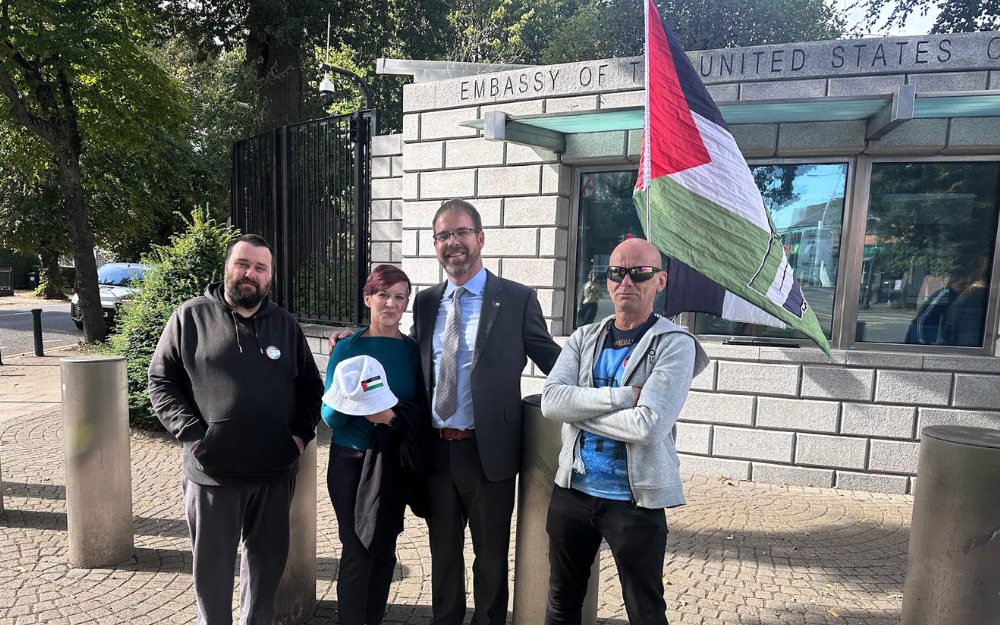
Wisconsin State Rep. Ryan Clancy (third from left) and his wife Becky Cooper (second from left) with protesters outside the U.S. Embassy in Dublin, Ireland. (photo credit: Rep. Brianne Brown)
I traveled to Ireland last week as part of Wisconsin’s legislative delegation that included a dozen Republicans and three other Democrats. We met with the head of the Irish Senate, mayors, business owners and staff from the Ministry of Foreign Affairs and the American Embassy. I stayed a few more days to meet with more of our counterparts in the Irish legislature and with the Palestinian Embassy and learn more about their views on what is happening in Gaza.
It’s clear, like in the United States, where only 8% of Democrats and 32% of Americans overall approve of Israel’s military actions, that the Irish people are also overwhelmingly opposed to genocide. As the staff at their Ministry of Foreign Affairs noted, the Irish “feel incredibly strongly about this conflict,” empathizing strongly with the Palestinian people’s occupation in large part because of Ireland’s own lengthy and brutal occupation by Britain.
Pro-Palestinian protests are common. A significant one happened shortly after our visit to the parliament. A few days later, as we left the American Embassy, we met another group. Protesters there let us know that it was their 81st consecutive week at that location. Elected officials we met and their staffs reported that there were sizable and frequent pro-Palestinian protests even in remote rural areas like the Aran Islands.

“Saoirse don Phalaistín” (in Irish means, “Freedom for Palestine”) painted on a pub in Dublin. (photo credit: Becky Cooper)
Unlike in the United States, though, where our elected officials are lagging far behind the shift in public opinion, Irish officials are solidly pro-Palestine, and have been for years. Indeed, I was unable to find any elected official willing to justify Israel’s genocide. Even the moderate Chairperson of the Senate, Mark Daly, joined an attempted flotilla to Gaza in 2010 along with more left-leaning elected officials.
Wisconsin has a great deal in common with Ireland. We both have populations of just under 6 million people. We both have strong dairy industries. We drink a lot of beer. And the economic ties are significant. Irish companies employ over 6,000 people in Wisconsin, from agriculture to biofuel. The total trade between Wisconsin and Ireland last year was over 3.6 billion dollars.
Unfortunately, Wisconsin’s current state law may jeopardize that.

Senator Mark Daly, Chair of of the Irish Senate, and Representative Clancy in Leinster House, the parliament of Ireland.
Ireland, along with other countries such as Spain and Poland, are moving to pass legislation that would end trade with Israel’s illegal settlements.
Many Irish go to great lengths to note that this is not a boycott, simply a recognition of and compliance with international law and the ruling from the International Court of Justice that countries have an obligation to end trade with illegal settlements specifically in any part of the world. Certainly, countries could – and likely will – move forward wider-scale boycott legislation, now that the U.N. has declared the genocide to in fact be a genocide, but the Irish have been careful to note that is not the case with this legislation.
In 2018, Wisconsin enacted Act 248, which bans governments and corporations doing business with Wisconsin from boycotting Israel. This legislation was based on an Executive Order from Governor Scott Walker issued the year before, and on model legislation from ALEC, a far-right think tank, but passed without significant Democratic resistance. Wisconsin’s version not only stops boycotts of Israeli goods generally, but also prohibits governments and companies with state contracts from opting out of doing business with an entity “in a territory under Israeli jurisdiction.” That includes the clearly-defined illegal Israeli settlements which Ireland, and other countries, are moving to cease trade with.
Not only does Wisconsin’s boycott ban run afoul of international law (since third party states are required to “abstain from entering into economic and other forms of relationship and dealings” with entities that are in violation), but it could have massive repercussions on Wisconsin – Ireland trade, as companies doing business with Wisconsin would have to choose between those contracts with Wisconsin or following their own domestic and international laws.
Stakeholders in Ireland are concerned.
The Irish Ministry of Foreign Affairs said their perspective “is based on the application of international humanitarian law” and noted Ireland is “moving from discussion to action” in order to get a ceasefire in Gaza, and talked about the “sacrifices” they’re willing to make for it.

The entire Wisconsin delegation in the U.S. Embassy in Dublin (photo credit: Becky Cooper)
Senator Mark Daly, whose role has been largely focused on encouraging trade with U.S. states, went to great lengths to underline the many economic ties between Wisconsin and Ireland (including, of course, Irish Fest, which is well known in Ireland), and is concerned about the impact these policies would have.
Business owners in Ireland, ones with close ties with Wisconsin, let us know they were already panicked with the instability of tariffs and U.S. trade policy under Trump, trying their best to be agile but unsure of where to invest in such volatile circumstances. They know that a conflict, or even uncertainty, between trade policies would make that worse.
U.S. Embassy staff referred to the Irish legislation as “boycott” legislation, and expressed concerns that it could harm both economic and diplomatic relations. The American staff we met with, installed by Trump, tried to make the case that boycotts aren’t effective, that the Irish legislation is just “performative,” that “[the United States] is going to support Israel and trade with Israel” and that “any resolution at the end is just between the Palestinians and Israel. We don’t want to be put in the middle.”

Representative Clancy and Ambassador Dr. Jilan Wahba Abdalmajid at the Palestinian Embassy in Dublin (photo credit: Tara Harrison)
The Ambassador at the Palestinian Embassy in Dublin, who noted that I was the first American elected official to visit (as Ireland officially recognized Palestinian statehood in May of 2024), expressed grave concerns that U.S. embassy staff characterized the Irish legislation as a boycott, noting that it was simply a reflection of international law dating back to the end of World War II.
I would have visited the Palestinian Embassy in the United States, but we don’t have one. While 157 other U.N. countries have recognized Palestinian statehood, the United States has not. Nor could I visit the Palestinian Mission in the U.S. because Trump closed it in 2018, during his first term, and then closed the Office of Palestinian Affairs in May of this year, leaving few direct options for diplomacy.
When I met with Irish legislators Sen. Alice-Mary Higgins and Aengus Ó Snodaigh, T.D., they spoke of their concerns about trade impacts, but also noted the U.S. Chamber of Commerce had attempted to influence their legislation and to “lecture” them, fearing the economic impact. Fortunately, they’re confident their colleagues will stay strong and do the right thing for Palestine, as they have the right to do.
So, it falls to us to fix our legislation.
Let me be clear: Wisconsin should repeal our right-wing 2018 legislation because it’s the right thing to do. Because boycotting is a distinctly effective American right and tradition, from the Boston Tea Party to Alabama buses to South African products during apartheid to Jimmy Kimmel. And because we should use every means at our disposal to stop Israel’s horrific genocide which, as Americans, our dollars and political support are directly responsible for.

From left, Senator Alice-Mary Higgins, Rep. Ryan Clancy and Aengus Ó Snodaigh, TD in the courtyard of Leinster House, the Irish Parliament (photo credit: Becky Cooper)
But perhaps conservatives – from both parties – who are unwilling to do the right thing on moral grounds, and who are somehow compelled to criminalize the discussion of the genocide rather than moving to end it, might be swayed by economic arguments. I have some hope that even staunch conservatives will be hesitant to let a foreign country dictate our economy as they have our morality.
This fall, a group of like-minded members of the State Assembly will be introducing legislation that restores the right of Wisconsin units of government and businesses to boycott.
As the chair of the U.N. Commission noted in the report declaring Israel’s actions to be genocide: “Every day of inaction costs lives and erodes the credibility of the international community. All States are under a legal obligation to use all means that are reasonably available to them to stop the genocide in Gaza.”
In Wisconsin, we have the means and the duty to act. The time is now to restore Wisconsin’s Right to Boycott.
As a lifelong activist, organizer and advocate, Wisconsin State Representative, Ryan Clancy has consistently stood in defense of civil rights and social justice. In 2020, Clancy became the first open socialist elected to public office in Milwaukee since 1956.
In 2022, alongside Rep. Darrin Madison, he became one of the first two socialists in state government in 86 years. Ryan uses his unique skills, experience and advocacy to benefit all of Milwaukee’s residents.












